Interview conducted by Cindy Klauss & Diane Hopkins, All Rights Reserved
Back to Previous Page | Continue to Next page
Cindy: When did you first know that Moonlighting was going to be a hit?
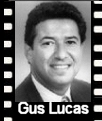 Glenn: I didn't. In fact, I truly believed I was doing it purely to amuse myself. I vividly remember a phone call from a guy named Gus Lucas, who was a Vice President of ABC at the time. We'd done four or five episodes and he called and he said, "Listen. I just want to tell you I love the show. I think you're doing an amazing job. The show is 64th in the ratings." I'm making up the number cause I don't remember the real number. He said, "I don't think it's going to get much higher." And I said, "Yeah, I know, " cause I didn't think it was gonna get much higher either. I mean, frankly, people didn't understand the show initially, when it first premiered, I want to say his name is Howard Rosenberg.
Glenn: I didn't. In fact, I truly believed I was doing it purely to amuse myself. I vividly remember a phone call from a guy named Gus Lucas, who was a Vice President of ABC at the time. We'd done four or five episodes and he called and he said, "Listen. I just want to tell you I love the show. I think you're doing an amazing job. The show is 64th in the ratings." I'm making up the number cause I don't remember the real number. He said, "I don't think it's going to get much higher." And I said, "Yeah, I know, " cause I didn't think it was gonna get much higher either. I mean, frankly, people didn't understand the show initially, when it first premiered, I want to say his name is Howard Rosenberg. 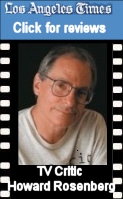 Who's the chief critic for The LA Times...who wrote a scathing review called Beauty and the Beast? Three weeks later, Rosenberg wrote another review, where he basically said, "I'm sorry, I didn't get it." But it took people a while to understand what it was we were doing. And it really wasn't until the second time around, when the shows reran in the summer, the show began to go somewhere.
Who's the chief critic for The LA Times...who wrote a scathing review called Beauty and the Beast? Three weeks later, Rosenberg wrote another review, where he basically said, "I'm sorry, I didn't get it." But it took people a while to understand what it was we were doing. And it really wasn't until the second time around, when the shows reran in the summer, the show began to go somewhere.
Cindy: I really think you have to watch them several times to catch a lot of the stuff.
Glenn: Yes, it does go by very quickly. It's sort of like a Marx Brothers movie in that sense, you know. When did I know? I didn't. I really didn't until, and even when it was happening. I was in the middle of it and you're working ridiculous hours. And I didn't really get it until I flew to Rochester, New York, with my wife to do something at the college I went to. And when I got off the plane there at the Rochester Airport, there were a lot of reporters waiting. I had not had that experience before. I got off the plane and there were all these reporters. And it took me a second to understand that they were there because they wanted to talk to me. And the reason they wanted to talk to me was they wanted to know is it Sam's baby or is it Dave's. 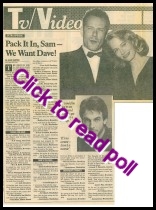 And that was really the first time that I consciously went, "Ooh, this is big," you know.
And that was really the first time that I consciously went, "Ooh, this is big," you know.
The other time when it really hit me was I went on a vacation, which was a really unusual thing. And we went to Hawaii. We went to this island called Maui, at this resort, and my little boy was with me. He must have been all of three or four and we went to the gift shop and in the gift shop they had a magazine rack. And on the magazine rack, was Mad Magazine. And on the cover of Mad Magazine, were Bruce and Cybill, and they were trumpeting the fact that they were doing a parody of Moonlighting. That, for me, was like, WOW, that's big! That was a big moment. As a kid, I had read MAD magazine, and so that was really neat. A couple of things like that.
|
| "Moonlighting" was poked fun at several times in both "Mad" and "Cracked" Magazines. This cover shot is from October 1986 in a send up on TV in general. The full show parody was done in the July 1986 edition of "Mad" and was called "Moon-Fighting." Click here to read it. |
Cindy: There are several shows that stand alone as unique achievements in television: The Dream Sequence Always Rings Twice; Big Man on Mulberry Street; and Atomic Shakespeare. And in hindsight they are some of the best hours in television, ever. But what kind of risk were you as the Executive Producer/Creator and the studio taking in attempting these shows?
Glenn: Oh, I have no idea. I'm not aware that I was...I mean I know I was taking a risk, in a sense that, but I didn't...it's not like, what's was somebody going to do, shoot me? You know, take away my driver's license? It's not a risk, and they pay you a lot of money. So it's not like, it's not a risk; the worse that would happen is somebody would come along and go, "You're fired." And I didn't believe they would do that. So, but no risk. The risk was if you didn't do consistently interesting shows, people would stop watching, and I was constantly afraid of that. There was a tremendous amount of pressure to do 22 a year, which is what a normal television show does. But to do those kinds of shows, frankly, we couldn't do 22 a year. It took longer to write them, it took longer to edit them; it took longer to mix them. That was the risk; was how long could I keep that sort of charade going on with it and the network would accept not getting a new show every week. You know. At a certain point the combination of that and the tensions on the set and all, you know, at a certain point obviously I left. HAHAHA. And the way of doing things changed. And I think you can see that in the shows.
Diane: You sure can.
Glenn: But, risk is the wrong word; it wasn't a risk. It was an opportunity. And, I took the opportunity. And it continues to pay dividends in my life. I mean, people still invite me to work with them, I think, on some level based on their enthusiasm for that work, you know, so...
Diane: Is it harder to do drama or comedy? You had some really excellent moments of both in Moonlighting. And I guess, which ones are you most proud of: the dramatic moments or the comedic moments?
Glenn: Oh, I'm proud of all of it. And it's not harder, you know. It's harder to bring up your kids. I mean, this stuff is mostly fun. The hard part is the pressure, but that's part of every profession. That's what makes you professional. Somebody says, not only do you have to do this, but you have to do it by this day, at this time, and you know, you have to be ready for Christmas; you know, all that stuff. 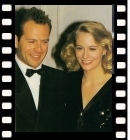 But no, they're both... look, Bruce is an amazing actor, so you know, it's not hard to write drama, it's not hard to write comedy. And the great thing was, he was there and he could act all of it. Cybill has tremendous gifts, and you know. She could, she would surprise us and do wonderful things. You know, that's not hard. To me, you know what would be hard is doing 22 episodes of the same thing every week. I'd blow my brains out. I just have no interest in doing that. To me that was always the great trap of television. So I thought if I was going to do television, how can I keep it interesting? I swear to God, so much of the energy was really about how do I stay awake? How do I keep myself interested? How do I continue to care? And if I care, then maybe Bruce and Cybill will care. And if Bruce and Cybill care, maybe the audience will care. And that occupied my thoughts really more than anything. And that's the reason you reach out and you get people like Orson Welles, or Eva Marie Saint, or Stanley Donen or Billy Joel or...because you're trying to keep everybody interested.
But no, they're both... look, Bruce is an amazing actor, so you know, it's not hard to write drama, it's not hard to write comedy. And the great thing was, he was there and he could act all of it. Cybill has tremendous gifts, and you know. She could, she would surprise us and do wonderful things. You know, that's not hard. To me, you know what would be hard is doing 22 episodes of the same thing every week. I'd blow my brains out. I just have no interest in doing that. To me that was always the great trap of television. So I thought if I was going to do television, how can I keep it interesting? I swear to God, so much of the energy was really about how do I stay awake? How do I keep myself interested? How do I continue to care? And if I care, then maybe Bruce and Cybill will care. And if Bruce and Cybill care, maybe the audience will care. And that occupied my thoughts really more than anything. And that's the reason you reach out and you get people like Orson Welles, or Eva Marie Saint, or Stanley Donen or Billy Joel or...because you're trying to keep everybody interested.
Because television implicitly is a manufacturing business, and series television for an actor, for a writer, for a director, for a designer, for anyone who's trying to make a living in the Arts, most people who will gravitate to that are fundamentally itinerant. They get into it because they really don't want to do the same thing every day. Now, the irony of that is that you get into a successful series and one day you wake up and say, "Oh, my God, I'm doing the same thing every day." So part of my mission was not to let anybody feel that way. So literally, one week we'd do a musical; the next week we'd do Shakespeare. The next week we'd do boxing; the next week we'd do, you know, period pieces, and it was really about keeping everybody interested. And, um, it was completely self-serving, and it just tickles me that the audience likes it too.
Diane: Is that where breaking the fourth wall came from?
Glenn: Yeah, it just tickled the hell out of me. I just thought it was funny and it wasn't terribly original. I was very surprised that people reacted the way they did, you know? Because they seemed to react so strongly to it. And they seemed to think it was this stroke of genius. And I ripped it off from the Bob Hope and Bing Crosby movies.
George Burns used to turn to the audience on The Burns and Allen show. I guess they hadn't seen it in twenty years or so. It's so funny and it just cracks me up. And it would seem consistent stylistically with everything else we were doing. I remember, I think it was in the fifth episode, we were doing a scene. I mean, here was my problem, and it was a constant problem. You're doing a detective show; and detective shows are just stupid. And because as I say, they involve false jeopardy. They're just filled with it. 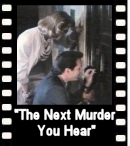 You get to a scene where the two detectives have to go to somebody's house and the somebody isn't home. And they have to get inside, because they have to find a clue. So now you have the big scene where somebody picks a lock. And it's like, " My God, who cares, we know you're going to get in there, because you've got to get in there, because you've got to find a clue, because you've got to go to commercial, so you can come back, catch the crook, and what a bunch of malarkey." And literally, like the second show, I had them going to this disc jockey's house. And they had to get inside; and they didn't have the key. And I wanted the audience to know that I thought this was as stupid as they thought it was. And so, I remember...but Bruce has to pick the lock. So I wrote that he takes this bobby pin from her hair, and he sticks it in the lock, and she says, "What are you doing?" He says, I still remember, "you put the straight pin in, you pull the straight pin out, you put straight pin in, and you shake it all about. You do the hokey pokey, and you turn yourself around, that's what it's all about." And I thought, "Kinda audacious, can we get away with that?" And, obviously, we could.
You get to a scene where the two detectives have to go to somebody's house and the somebody isn't home. And they have to get inside, because they have to find a clue. So now you have the big scene where somebody picks a lock. And it's like, " My God, who cares, we know you're going to get in there, because you've got to get in there, because you've got to find a clue, because you've got to go to commercial, so you can come back, catch the crook, and what a bunch of malarkey." And literally, like the second show, I had them going to this disc jockey's house. And they had to get inside; and they didn't have the key. And I wanted the audience to know that I thought this was as stupid as they thought it was. And so, I remember...but Bruce has to pick the lock. So I wrote that he takes this bobby pin from her hair, and he sticks it in the lock, and she says, "What are you doing?" He says, I still remember, "you put the straight pin in, you pull the straight pin out, you put straight pin in, and you shake it all about. You do the hokey pokey, and you turn yourself around, that's what it's all about." And I thought, "Kinda audacious, can we get away with that?" And, obviously, we could.
On the pilot, I remember the scene was...where we had the same sort of thing was when Bruce initially meets Cybill. Cybill's brought in by Allyce Beasley whose playing Agnes Dipesto; Bruce is playing basketball. He's got a basket propped up above the door. As Allyce walks into his office, she opens the door and the basket falls on her head. And the whole scene, she plays the whole scene with the basket on her head. 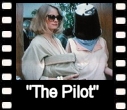 He walks over and says, "Hey, Miss Dipesto, how are you; you're looking a little pale today. And she says, "Mmmph mmmphhh". And the scene just plays. No one comments in an obvious way about the fact that this is a woman with a pail on her head. We staged the scene, and Jay Daniel, who is the line producer, and Bob Butler, who is the director, and a fabulous director, both looked at me and went, "Glenn," like, "You're not serious." And I just thought it was the funniest damn thing. And I didn't care...you know, they said what about the suspension of disbelief, and I said, "What suspension of disbelief? It's a television show. Let's entertain people. He said, "Well, the network will never go for this." And so I was always scared when we came to these bobby pin moments, and I thought...and the climax was, as I was going to say before, on the fifth episode, they have to get into this ballroom. And they have to find this man, this is prior to the pie fight, they have to find a man with a mole on his nose, and I'm sitting there writing the scene and it just started to come out in Dr. Seuss speak. And I just thought it was the funniest thing where the guy standing there is talking about the mole on his nose, so we wrote the scene and we filmed the scene.
He walks over and says, "Hey, Miss Dipesto, how are you; you're looking a little pale today. And she says, "Mmmph mmmphhh". And the scene just plays. No one comments in an obvious way about the fact that this is a woman with a pail on her head. We staged the scene, and Jay Daniel, who is the line producer, and Bob Butler, who is the director, and a fabulous director, both looked at me and went, "Glenn," like, "You're not serious." And I just thought it was the funniest damn thing. And I didn't care...you know, they said what about the suspension of disbelief, and I said, "What suspension of disbelief? It's a television show. Let's entertain people. He said, "Well, the network will never go for this." And so I was always scared when we came to these bobby pin moments, and I thought...and the climax was, as I was going to say before, on the fifth episode, they have to get into this ballroom. And they have to find this man, this is prior to the pie fight, they have to find a man with a mole on his nose, and I'm sitting there writing the scene and it just started to come out in Dr. Seuss speak. And I just thought it was the funniest thing where the guy standing there is talking about the mole on his nose, so we wrote the scene and we filmed the scene.
Cindy: All of the outtakes, though. That poor guy.
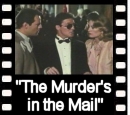 Glenn: That poor guy. He was in such pain. And then I literally had Bruce say Dr. Seuss, literally sort of tip his hat. And then at one point they walk into the kitchen and these swinging doors in their clothes and walk out a second later and they've got uniforms on. This is right out of a Hard Days Night or Help, or whatever the hell it is. And, which is right out of The Marx Brothers; which is right out of...there is not an original idea here, folks. But I remember the network calling and saying, "You can't do that, people. You can't do that." And I said, "Well, that's what I'm doing," and the show was delivered so late there was really...and nobody thought the show was a hit anyway, so it didn't matter. And you know, the rest, as they say, is history. But was it a risk? It's not a risk.
Glenn: That poor guy. He was in such pain. And then I literally had Bruce say Dr. Seuss, literally sort of tip his hat. And then at one point they walk into the kitchen and these swinging doors in their clothes and walk out a second later and they've got uniforms on. This is right out of a Hard Days Night or Help, or whatever the hell it is. And, which is right out of The Marx Brothers; which is right out of...there is not an original idea here, folks. But I remember the network calling and saying, "You can't do that, people. You can't do that." And I said, "Well, that's what I'm doing," and the show was delivered so late there was really...and nobody thought the show was a hit anyway, so it didn't matter. And you know, the rest, as they say, is history. But was it a risk? It's not a risk.
It was great fun, and here's the key to it. And people don't realize this, verbally the show was extraordinarily difficult. And most of that fell on Bruce. I'd write him these huge monologues, with all kinds of verbal curlicues in them and stuff, and he has a facility. You could hand him a page of dialogue and 20 minutes later he had it memorized, and he could do it. He could do it while he moved. I'll tell you something else. In many ways, he was sort of the guardian of that style. He would call me. I'd be in the office either cutting or casting or writing. And he would call me and go, "You'd better come down here." I'd say, "What's the matter?" He'd say, "They're changing something." He understood that it was all musical; cause it really is musical, if you go back and watch the shows...and not everyone understood that. And certainly guest stars didn't always understand it. And, so we had a rule: no one could change anything without calling me and asking me to come down. But, Bruce was really the guardian of that, you know, because he was there.
Cindy: He knew how it felt coming out of his mouth.
Glenn: Yeah, he knew how it was supposed to work. He got it really quickly.
Continue to next page-->>>>

